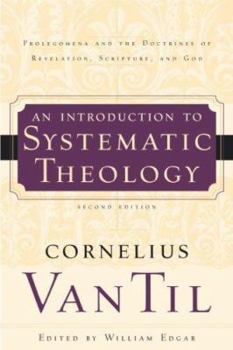An Introduction to Systematic Theology: Prolegomena and the Doctrines of Revelation, Scripture, and God
Select Format
Select Condition 
Book Overview
Van Til explores the implications of Christian theology, particularly for philosophy, as he discusses epistemology, general and special revelation, and the knowledge and attributes of God. Cornelius Van Til taught apologetics for more than forty-five years at Westminster Theological Seminary. This newly edited and typeset edition features an introduction and explanatory notes by William Edgar.
Format:Paperback
Language:English
ISBN:0875527892
ISBN13:9780875527895
Release Date:December 2007
Publisher:P & R Publishing
Length:416 Pages
Weight:1.30 lbs.
Dimensions:0.9" x 6.3" x 9.0"
Customer Reviews
2 ratings
THE CONTINUATION OF A SERIES BY THE FOREMOST PRESUPPOSITIONAL APOLOGIST
Published by Thriftbooks.com User , 15 years ago
Cornelius Van Til (1895-1987) was a Calvinist Christian philosopher and theologian, and perhaps the leading Christian exponent of "presuppositional" apologetics. He taught at Westminster Theological Seminary for more than 40 years, and was one of the leaders in the Orthodox Presbyterian Church. All of the six volumes in this "Defense of the Faith" series are student syllabi; thus, they may or may not be polished "books," unlike Van Til's other works. In the Preface to this 1971 work, Van Til indicates, "The first 'edition' of this syllabus appeared more than thirty-five years ago. It title then was: An Introduction to Systematic Theology. Since then much has happened in theology. Yet the old syllabus is now made available again in a practically unaltered form. The author has dealt with the main developments of recent theology in other writings. The most important of these is that of neo-orthodoxy." He adds, "The present syllabus has an apologetic intent running through it. A Reformed theology needs to be supplemented by a Reformed method of apologetics.... The non-Christian faith as a whole, as a unit, must be set over against the non-Christian faith as a whole. Piecemeal apologetics is inadequate, especially for our time." Van Til makes the interesting statement, "it is true that in the study of matters of the laboratories and the field, the Bible is only indirectly concerned. We do not go to the Bible itself for the facts with which we deal. On the other hand, it is true of theology that it gets its facts about God almost exclusively from the Bible. We say almost exclusively, because we also learn about God from nature. Hence we must say that it is only a matter of emphasis. We do not limit ourselves to the Bible when we study anything else." Later on, he admits, "Many non-Christians have been great scientists. Often non-Christians have a better knowledge of the things of this world than Christians have." However, he adds, "this is true IN SPITE OF their immanentistic view of life and because of the fact that they cannot help but work with the 'borrowed capital' of Christianity." He says, "It is true that all false religions have been 'religions of authority.' ... This authority that other religions have spoken of, however, is of a different nature from the authority of Christianity.... What really ought to be done, therefore, is to set the religion of Christianity over against the other religions in order to say that only Christianity is the religion of authority. At the same time it should be made clear that only Christianity is the religion of the Spirit." This entire series is of great interest to students of Van Til, presuppositional apologetics, Calvinist philosophy, or Christian apologetics in general.
Quick Review
Published by Thriftbooks.com User , 24 years ago
Very insightful introduction to theology as a comprehensive and cohesive unit of truth.This title is NOT easy reading, but it is a title which will give a lot of material to consider. Excellent, excellent, even if you disagree with Van Til, it is excellent.






